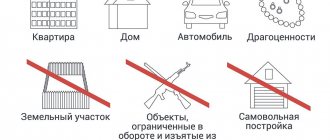Every citizen or legal entity has the right to protect their ownership of property assets or finances. The guarantee of this right is a set of legislative norms aimed at reclaiming property from others, as well as bringing them to criminal or administrative liability for illegal actions. In the presented material you can find out what illegal retention of someone else's property includes, and what sanctions can be applied to the violator.
What is unlawful detainment?
The right of ownership of money, objects, things, real estate or securities includes the ability to use them at one’s discretion, including transferring them to other persons for a fee or free of charge. As a rule, this happens by drawing up written documents - contracts, acts, receipts, invoices, etc. Only in this case do other persons have the legal right to retain the thing for a certain period of time.
Finding property or money in the wrong hands does not always entail criminal liability; for this, the following circumstances must be established:
- illegality of their receipt, including through the commission of direct criminal acts (theft, fraud, etc.);
- an attempt to convert property entrusted to a citizen on a legal basis to one’s own benefit for selfish purposes (appropriation);
- spending, consuming or selling someone else's property entrusted to a citizen to generate income for one's own benefit (embezzlement);
- the owner does not receive any compensation for this.
Note!
If someone else has received entrusted property, but retains it without the purpose of turning it into his own benefit, the criminal offense under Art. 160 of the Criminal Code of the Russian Federation will be absent. In this case, it is permissible to use civil methods of defense - filing a claim for the recovery of items and objects from someone else’s illegal possession, as well as recovery of damages and lost profits.
If signs of a criminal offense are identified, civil defense methods may also be taken. As a rule, such property is confiscated from the guilty person at the investigation stage, after which it is transferred to the owner. Another option for protecting rights is to file a civil claim in criminal proceedings.
Such property may include:
- real estate - apartments, buildings, private houses, land plots (appropriation may involve re-registration of rights against the will of the legal owner through forgery or other illegal means);
- movable things, objects, products, including inventory assets, entrusted by the enterprise for the duration of labor or official duties;
- money in cash or non-cash form;
- various types of securities.
For imposing sanctions under the Criminal Code of the Russian Federation, it is not the type of property that will have legal significance, but its size (significant damage, large, especially large).
Who is considered a bona fide owner?
From January 1, 2022, bona fide owners will be paid compensation for money spent on property that was seized from illegal possession. To do this, it is necessary that the purchaser of the property be recognized as bona fide - such an owner does not and cannot know that the seller acquired the property being sold illegally and should not be its owner. A bona fide purchaser must prove that reasonable care and diligence was exercised when completing the transaction. He must prove that he was able to check the counterparty to the transaction and he had no doubts about the honesty of the seller. A conscientious buyer must rely on data from official registers and not be aware of fraudulent activities with property.
According to general rules, a bona fide buyer should not be deprived of purchased property for which the new owner paid the actual price. But the legislation provides for norms according to which the seller or the previous owner can reclaim property from illegal possession.
Types of responsibility and punishments
If property is unlawfully retained by another person, there is a basis for the following types of liability:
- according to the norms of the Civil Code of the Russian Federation - filing a claim in court for the recovery of property, as well as for the recovery of losses and lost profits;
- according to the administrative composition of Art. 19.1 of the Code of Administrative Offenses of the Russian Federation - if arbitrariness is seen in the actions of the offender;
- according to Art. 160 and Art. 330 of the Criminal Code of the Russian Federation - criminal sanctions will follow for misappropriation, embezzlement or arbitrariness.
If the property came to the offender in an illegal way, other elements of the Criminal Code of the Russian Federation will be applied (theft, robbery, etc.).
According to the norms of the Civil Code of the Russian Federation, possible types of punishment, in addition to the return of things or objects to the proper owner, will include compensation for actual losses incurred and lost profits. If moral or mental suffering was caused to the owner, recovery of moral damages is also allowed.
According to the provisions of Art. 160 of the Criminal Code of the Russian Federation, possible penalties will be chosen by the court based on the degree of danger of the crime and the consequences that have occurred. These include:
- fine of up to 500 thousand rubles;
- mandatory work;
- forced labor;
- correctional work;
- imprisonment is applied as a sanction for all four parts, the maximum term of imprisonment is 10 years.
For embezzlement or embezzlement, according to the norms of the Code of Administrative Offenses of the Russian Federation, liability does not arise even if the amount of the stolen goods is minimal, this is only a criminal offense.
The court's decision
There are situations when the court's decision when considering a case on the recovery of property from illegal possession will be negative. The owner will definitely lose the claim; if the property is destroyed, there is nothing left to claim. An owner may be recognized as an unscrupulous owner if he:
- Quickly resold the item;
- Sold it at a price below the market price;
- Depends on the buyer's decision.
The court recognizes such transactions as invalid. As a result, the buyer must return the item to the owner, and the contract is terminated.
The Supreme and Supreme Arbitration Court, in a joint Resolution of the Plenums of April 29, 2010 No. 10/22, explained that if the property is not registered in the Unified State Register of Real Estate under the previous owner, the buyer may be considered dishonest. If the acquirer has managed to register other people in the real estate, then he must write them out from there. Finally, if the buyer refuses to comply with the approved court decision, then the plaintiff needs to obtain a writ of execution and contact the bailiffs, who will forcibly evict the buyer and his family members from someone else’s property.
The buyer is also recognized as a bona fide buyer if the item was purchased on a reimbursable basis. If the transaction was gratuitous, then the new owner returns the property to the previous, legal owner of the thing, regardless of how the property was acquired.
The buyer must prove that the property was transferred to him at the will of the previous owner. But if the property was seized by a court decision, which was subsequently overturned, then the court recognizes the transfer of property against the will of the owner.
When considering a case, the court checks the legality of the owner’s powers, and if the lower court made a mistake in determining the legality, then the higher authority must send the case for a new trial.
How to distinguish embezzlement from embezzlement or theft?
When investigating criminal cases, the qualification of the crime is of particular importance, including the correct distinction between different types of theft. According to the provisions of the Criminal Code of the Russian Federation, crimes against property include theft, robbery, robbery, arbitrariness, misappropriation, embezzlement, etc. The distinction between these methods of theft is made depending on the nature of the criminal’s behavior:
- violent actions or the threat of violence during the seizure of property accompany robbery, robbery, and in some cases theft;
- misappropriation, embezzlement or fraud occurs without the use of violence.
Misappropriation and embezzlement are included by the legislator in the content of one article 160 of the Criminal Code of the Russian Federation. This is due to a similar procedure for receiving property by the guilty person - it was legally entrusted to them by the owner.
Unlike embezzlement, theft is the secret taking of any type of property. In most cases, the owner may not even know about illegal actions until he discovers the loss. Embezzlement is preceded by the voluntary transfer of assets or money to another person, and illegality of actions can arise after a certain period of time.
The difference between embezzlement and embezzlement lies in the nature of the illegal actions with the entrusted property. Appropriation occurs by making the ownership and use of property legal (for example, by using false documents to register ownership of real estate). Embezzlement is characterized by its use, expenditure or alienation, as a result of which the offender receives a benefit. Despite the different nature of criminal acts, the punishment for misappropriation and embezzlement is the same.
Reclaiming property from a bona fide owner
The acquired property will be taken away from a bona fide owner at the request of the previous owner in several cases:
- The thing left the possession of the legal owner against their will, for example, due to malicious intent, theft, loss, or other interference of third parties in ownership.
- The property was purchased from a seller who had no authority to sell. For example, a power of attorney to complete a transaction was not issued, or an agency agreement was not signed.
Recent changes to the Civil Code provide broader protection for the rights of a bona fide purchaser, and he can now count on compensation for losses when purchasing property from an illegal owner. So, if within six months a bona fide purchaser has not received compensation for losses under the writ of execution, then he is paid a one-time lump sum compensation at public expense.
The amount of such compensation is determined by the court in each specific situation. For example, if we are talking about the purchase of housing, then he can be paid either the value of the property under the purchase and sale agreement, or at the cadastral value of the claimed property, which is determined on the date of entry into force of the judicial act on compensation for expenses incurred.
If during the enforcement proceedings the acquirer was able to partially compensate for the losses, the compensation will be reduced by the amount of expenses already collected.
After payment of compensation, the state will have the right to recover expenses from the illegal seller of real estate, which will demand the return of the amount of expenses spent on compensation to the bona fide purchaser.
Courts, Real estate
Save:
Procedure for returning your property
Having established that the property is in someone else's use, the owner can take various actions to protect his interests. To bring to criminal liability, an application for appropriation of someone else's property is written, which indicates the following facts:
- information about the person who should be in possession of movable or immovable property;
- the circumstances of its transfer to another person for a certain period;
- evidence of illegality of presence;
- a description of the actions that the legal owner took to return his property;
- a request to verify the illegality of actions and bring them to justice according to the norms of the Criminal Code of the Russian Federation.
Note!
Each received application is subject to verification, the results of which will be notified to the applicant in writing. If the criminal offense is not confirmed, the applicant will be advised of other ways to protect interests.
If signs of a criminal act are established during the inspection, the owner will be recognized as a victim. Further investigation will be carried out by law enforcement agencies, and during the criminal case, property may be seized as evidence. At the end of the criminal process, it will be transferred to the rightful owner, and as part of a civil lawsuit, you can seek compensation for damages and lost profits.
If there are no signs of a criminal act, the statement of claim is sent to the court according to the general rules of the Code of Civil Procedure of the Russian Federation. Cases are heard in a court of general jurisdiction, and during the process, the disputed property may be seized. If the violator has already managed to register ownership of real estate, the entry in the state register of the Unified State Register of Real Estate is canceled, after which a similar right will again arise for the legal owner.
If damage is caused to property during the period of illegal possession, it is fully compensated at the expense of the culprit. To do this, a calculation of the losses incurred or expenses necessary to restore the previous state of objects, things or objects is submitted to the court. Its forced removal from someone else's possession will occur on the basis of a writ of execution through the bailiff service.
If you need the help of a lawyer in a case of misappropriation of someone else's property, contact our experienced lawyers for help.
Protection from raiding - how to protect your company?
In the global understanding, raiding is ineradicable as long as there are gaps in legislation, bribery and corruption. But any company can reduce the risk of falling into the hands of raiders. To do this, you should adhere to the following rules:
- powers in a power of attorney for any employee should be strictly limited to solving a narrow range of tasks;
- transfer of assets and alienation of property may be the prerogative of the board of directors rather than managers;
- the process of sale (transfer) to third parties of shares in the authorized capital of the company, real estate, fixed assets must be strictly regulated by a separate internal regulatory document of the company defining the fundamental provisions in the statutory documents;
- the choice of employees, especially top managers, accountants, financially responsible and trusted persons should be taken carefully - it is better to check their identities through security services or special agencies;
- share capital should be consolidated as much as possible in one hand; if there are many shareholders, it is necessary to implement a system of measures to prevent the purchase of a certain number (giving the right to a decisive vote) of shares by third parties without the knowledge of the founders (major shareholders);
- the charter should include a rule on the pre-emptive right to purchase shares or shares, real estate, fixed assets, internal (intra-holding) bills and other debt obligations, respectively, by participants (founders) and legal entities included in a holding or a group of enterprises;
- nominees in company management should be avoided;
- the company must have a well-functioning information security system;
- the organization requires separate regulation and strict accounting of actions for issuing bills and other debt obligations;
- regulation and strict accounting of all actions for the production, storage and use of seals and stamps used by the organization in its activities are necessary;
- it is necessary to regulate and strictly take into account the relationships between managers and employees included in the administrative apparatus of the company, with the introduction of the practice of “internal notes” at least in relation to those actions or processes that may lead to the formation of debt, the sale of shares in the capital of the company, real estate and fixed assets ;
- concentration of functions for the sale of the main assets of the company and the disposal of large sums of funds in the hands of one person who is not the main or sole owner of the company should be avoided; when business owners are removed from the management of the company, it is necessary to regulate in the statutory documents the procedure for obtaining their consent to carry out significant transactions;
- it is necessary to instruct a lawyer or legal department to check the databases of the State Automated System “Justice” and other databases of the courts at least once a month for the presence of cases in court proceedings involving or in relation to the company;
- it is desirable to enshrine in the statutory documents of the company the principle according to which all actions related to the sale of shares in the authorized capital, real estate and fixed assets are carried out by a specific notary or notaries of certain notarial districts;
- All activities of the company must be carried out in strict accordance with current legislation.
It is difficult for a full-time lawyer who has never encountered the seizure of someone else’s property to assess all the risks and reduce them. In cases where an organization is subject to hostile takeover, the affected persons face a number of problems: law enforcement agencies refuse to initiate criminal cases;
- checks on allegations of crime are carried out by employees of the EBiPK units of the Ministry of Internal Affairs of the Russian Federation formally and in violation of procedural deadlines;
- inspection materials are sent from one territorial unit to another, from the police to the Investigative Committee in connection with a dispute over jurisdiction;
- It is not uncommon for a person to refuse to initiate a criminal case citing the existence of a corporate dispute and a civil violation.
In recent years, the term “technical failure”, not provided for by law, has become widespread in recent years - operational officers, not having time to complete the inspection within the maximum 30-day period provided for by the Code of Criminal Procedure of the Russian Federation, issue unfounded decisions to refuse to initiate a criminal case in the hope that the decision will be canceled by the prosecutor’s office with receiving an additional month to conduct additional verification.
Object and subject of the crime
In characterizing the composition of a criminal act, a special place is occupied by the object and the objective side.
The object is understood as those social legal relations that are implemented within the framework of the circulation and redistribution of things. The objective side is the conditions under which the act was committed, as well as the cause-and-effect relationship between the action and the consequence.
In this case, the general rules for determining the subject composition are applied - a citizen who has reached the age of sixteen. This does not apply to all parts of Article 160 of the Criminal Code. Thus, in accordance with the third part, the subject can only be an official. It is understood as a citizen who is entrusted with the functions of material or administrative support for the activities of the organization, and who carries out his activities on the basis of a legally concluded employment contract.
An act must be committed only if there is direct intent, when a citizen really understands that there is criminal liability for this, but continues his illegal behavior. This is called direct intent to commit a crime.
Aggravating circumstances
In Art. 160 part 3 of the Criminal Code of the Russian Federation defines a special qualifying element - committing an act using official status or on a large scale. For these crimes the following is assigned:
- Fine of 100-500 thousand rubles. or representing the income of the perpetrator for 1-3 years.
- Up to 5 years of forced labor. In addition to the sanction, the judge may impose a restriction of freedom of up to 1.5 years.
- Up to 6 years in prison. Additionally, a fine of 10 thousand or the equivalent of a citizen’s income for 1 month and up to 1.5 years of restriction of freedom may be imposed.
- Deprivation of the right to conduct activities or hold positions established by a judge for up to 5 years.
Part 4 of norm 160 of the Criminal Code of the Russian Federation provides for sanctions for acts committed in amounts recognized as particularly large, or by an organized group. Those found guilty face up to 10 years in prison with a fine of up to 1 million rubles. or constituting the income of the perpetrators for a period of up to 3 years and with restriction of freedom for up to 2 years.
Service status
In part three, punishment is provided for citizens who committed an act using their official position. In this composition the subject is special. An entity that uses its official status to commit embezzlement or misappropriation is recognized as meeting the criteria defined in paragraph 1 of the note to norm 285 of the Code. To liability under part three of Art. 160 municipal or civil servants may also be involved. They may not be officials. Punishment is also imposed on other entities that meet the requirements formulated in paragraph 1 of the note to Article 201 of the Criminal Code. The actions of instigators, organizers, accomplices of a crime committed knowingly for them by a citizen using his official status are characterized according to the relevant part of Art. 33. Thus, the executor is a special subject holding a certain position or having specific powers. Part 3 of the norm in question also establishes punishment for an act committed on a large scale. According to the provisions of the note to Art. 158 of the Code, the value of the property is more than 250,000 rubles.
Comments on the article
Article 160 provides for several types of appropriation of someone else's property - misappropriation and embezzlement. These are two completely different ways of committing a crime, each of which has its own characteristics.
Like any other act, misappropriation or embezzlement has its own elements, as well as a number of aggravating circumstances for which stricter liability is provided. Both appropriation and embezzlement are, first and foremost, theft. Therefore, it is necessary to understand the interpretation of this definition. Theft is understood as the taking and appropriation of other people's things for oneself, and the extraction of material and other selfish benefits from them.
You can only steal property that belongs by right of ownership to another person. The lawful seizure of things and other valuables is not theft. This happens when bailiffs and executors take property to pay off debt obligations.
The property must be entrusted to the criminal. This means transferring things if there are legal grounds for a certain type of purpose.
Characteristics of assignment
Appropriation refers to actions aimed at obtaining property for one’s own purposes.
As a rule, things are voluntarily transferred to such a citizen for various reasons, for example, due to his work activity. Such an act has a specific purpose behind it - self-interest and thirst for profit. It is also necessary that there is no will of the owner to transfer the property in favor of another citizen. When talking about a crime, it is always necessary to keep in mind when it is considered completed. In the case of appropriation, this happens at the moment when the thing is turned in favor of the criminal. For example, when an obligation arose to transfer property to an entrusted person, which was not done without the necessary warning.
Characteristics of embezzlement
Embezzlement differs from embezzlement in many ways. First of all, this lies in the moment of completion of the criminal act. Thus, embezzlement is considered to have been committed from the moment when the money or property was actually consumed and put into circulation. Of course, all these actions must take place in the absence of the legal will of the owner.






